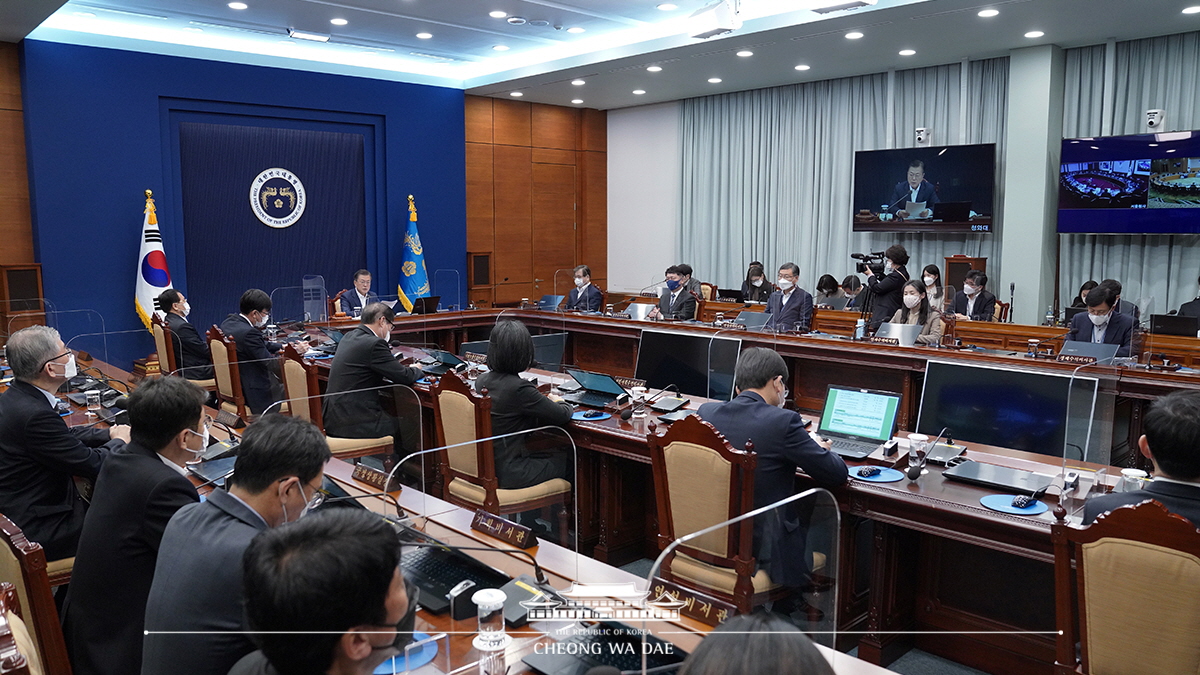이 웹사이트는 제19대 대통령 임기 종료에 따라 대통령기록관이 「대통령기록물 관리에 관한 법률」에 의해 이관받아 서비스하는 대통령기록물입니다. 자료의 열람만 가능하며 수정 · 추가 · 삭제는 불가능합니다.
다만, 「개인정보보호법」에 의하여 개인의 정보를 보호받기 원하시는 분은 관련 내용(요청자, 요청내용, 연락처, 글위치)을 대통령 웹기록물 담당자(044-211-2253)에게 요청해 주시면 신속히 검토하여 조치해 드리겠습니다. 감사합니다.
SPEECHES & REMARKS
BRIEFINGS

Let me begin the 7th Cabinet Meeting.
Statistics Korea’s recent jobs report points to a grave employment situation with the number employed falling by close to one million and the number unemployed surpassing 1.5 million. It is very painful to think about people’s livelihoods even when considering the fact that this situation is inexorably linked to the spread of COVID-19 and epidemic prevention measures.
What is more poignant is the worsening polarization among specific industries and groups. Brisk exports helped reduce job losses in manufacturing, but face-to-face service industries such as dining, lodging and wholesale and retail trade saw job losses increase significantly. The number of permanent jobs rose slightly, but most of the employment losses involved temporary and day-labor jobs. Unemployment among women and young people continued to worsen as well. Polarized job opportunities will immediately lead to polarized incomes.
I urge the Government to recognize the severity of the current employment situation and work out extraordinary measures urgently. The national economy is now making a rapid recovery as seen by the strong exports, but it will take some time for jobs to come back. For this reason, the public sector and fiscal spending should play a more active role to enable us to weather the current bleak employment situation.
First, to significantly expand job opportunities, the public sector will take the initiative to increase its pump-priming role. The central and local governments and public institutions will cooperate to implement the plan to directly create more than 900,000 jobs within the first quarter of this year without fail. The environment for private-sector job creation will be improved further as well. Through bolder investment support and regulatory innovation, we will expedite the implementation of 110 trillion-won worth of private- and public-sector projects and private infrastructure investments, thereby expanding the private sector’s capacity to increase employment.
Second, we will provide all-encompassing assistance to maintain private-sector employment. Support will be strengthened for those business lines suffering from severe employment shock, and additional measures will quickly be devised to expand assistance for job retention. We will further strengthen preemptive responses for industries designated for special employment support and regions affected by the employment crisis. We will also do our best to create conditions for maintaining employment, for instance, by reducing the burden of labor costs on SMEs and microbusiness owners through the employment stability funds and the Duru Nuri program to subsidize employment insurance and national pension contributions.
Third, we will significantly expand employment opportunities for those in need along with customized damage support for the underprivileged. The Government has provided livelihood support to buttress microbusiness owners through the third round of emergency relief payments. In addition, emergency employment stability support funds are being distributed to help stabilize the incomes of the contract-based self-employed, freelancers and drivers of corporate-owned taxis. Additional support measures for the vulnerable will also be made part of the fourth round of emergency relief payments to be drawn up in the near future.
At the same time, we will take extraordinary steps to come up with measures that will help expand job opportunities for young people and women in need. Subsidies will be provided to encourage employers to hire young people as regular employees, along with the efforts to actively create digital-sector jobs and other new employment opportunities for them. Programs to support young people who start new businesses will be significantly expanded. Along with the efforts to prevent women’s careers from being disrupted and to increase opportunities for them to reenter the workforce, we will devise multifaceted measures to help them maintain a balance between work and caregiving in particular.
Fourth, the employment safety net will be expanded and vocational training will become more advanced. We will strengthen our efforts to eliminate blind spots in the employment safety net, for instance, by striving to make the national employment support program take root and continually expanding employment insurance enrollment. Vocational training will be increased to provide practical job-searching assistance to the vulnerable. Concentrated efforts will be made to nurture talented, future-oriented individuals to lead new industries. I ask every ministry and agency to respond with all of their strength so that we can overcome the employment shock in January and quickly start on the job recovery path by making a turnaround in February.



